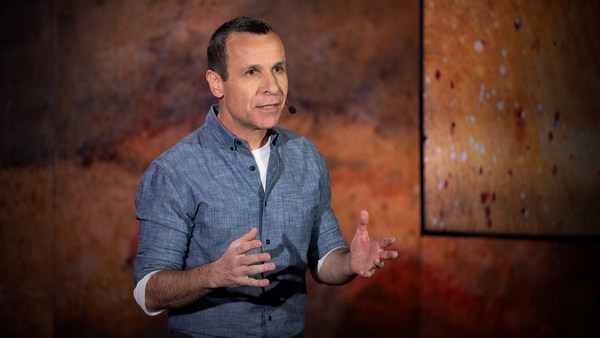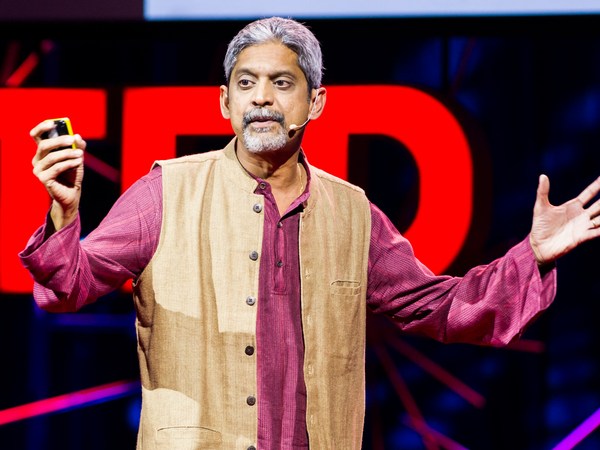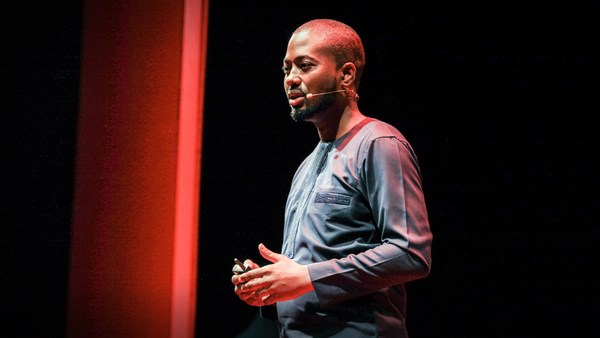Stress -- we all know what it is and we all handle it differently. Whether it's our thoughts speeding up or slowing down, eating our emotions or not at all, difficulty sleeping or just getting out of bed. Frankly, it sucks.
(Laughter)
But there's good stress too, you know, like preparing for the biggest public speaking event you've ever given.
(Laughter)
(Applause)
On a global platform.
(Laughter)
No, even the good stress can mess with you, but it's the bad stress that I came to talk about. And probably not for the reason you'd expect.
I'm a relationship manager for affluent individuals. Meaning, I work with wealthy folks and their families, hip to hip, helping them achieve their financial goals. I like to keep the economy in mind, because I know that whatever impacts the economy, impacts my clients, and it turns out stress is impacting the economy in a massive way. What if I told you that by some estimates, the cost of work-related stress in the US is close to 300 billion dollars annually?
Workplace stress, the stress causing this massive impact, is related to productivity and wellness. Today, that's what we're here to talk about. And by the way, it's linked to employee disengagement, chronic diseases that impact your work and work-related injuries and illnesses. And when you add up the cost of all five factors, it's an estimated 2.2 trillion dollars annually. That represents 12 percent of our GDP.
Now I know what you're thinking, "That is a lot of money, and how?" Stress is this deeply personal thing, it's crazy to think it can have such a massive impact. But consider this thought experiment to explain how. Imagine a single mother working a stressful job, in a stress-filled environment, where she sits 90 percent of the time. Maybe she doesn't have time to cook, so she chooses meals based off of convenience, which usually means what? Overly processed, high-sugar foods. Over time, this poor diet, mixed with stress from work, leads to a chronic disease. Let's call it diabetes. Medical care cost her and the company more money, which means more stress. Now, she's worried about her health and making ends meet, so she's probably distracted and less productive. But she can't be, remember? She's a single mother. Now she's thinking, "What if something happens to me? Who is going to take care of my child? Who is going to take care of my baby?" More stress. Now take that scenario, tweak it whichever way you'd like, and lay it over the nation, and you might start to see how we run up against that multitrillion dollar cost.
This all hits very close to home for me. My father's one of the hardest-working and most intelligent people that I know. Don't get me wrong, mom worked and provided too, but he definitely embraced the role of being the primary breadwinner. And I'm sure most of us can understand the stress and pressure that comes with taking care of our families. But when you combine that with workplace stress, do you know what could happen? Developing irreversible high blood pressure, eventually losing function of your kidneys and spending a decade on dialysis -- his fate. Now I'm happy to report that he did get a kidney transplant just last year. However --
(Applause and cheers)
However, for nearly a decade, neither the economy nor my family got the benefit from his work ethic or his intelligence, and as he would say, that's just really sad commentary. All I'm saying is, I think stress impacts the economy by reducing productivity and increasing health care costs. Makes sense? Right? But here's what doesn't.
Current research from the World Health Organization puts global spending on health at 7.8 trillion dollars. Research from the Global Wellness Institute suggests that the 4.5-trillion-dollar global wellness industry grew from 3.7 to 4.2 trillion between 2015 and 2017, and sees that growth into 2022. So what, why do you care? Because that growth is nearly twice as fast as the global economy, averaging about 3.3 percent in the same period. So what does all that mean? Every year, we're spending more per year on health, and the industries all about developing overall well-being and living a healthier lifestyle are growing almost twice as fast as the global economy, and yet, we're losing trillions of dollars per year in output. So what's up?
(Laughter)
Well, stress levels are up, and I believe that needs to change. I also believe the way we think about stress needs to change. So let's try by reframing how we view it. See, we tend to think about stress as a consequence, but I see it as a culture. Where do most of us spend our time? At work, right? Where we face that scale of finding that work-life balance. So the bonds between work, stress, health and wellness have never been closer. And yet, there's a massive disconnect in how we approach stress and well-being in the workplace. And we could blame many things, right? New tech, laser focus on shareholder returns, or my favorite, keeping up with the Joneses and taking pictures while we try. But at the end of the day, I'm afraid that we've created a culture where personal care and overall well-being are given the back seat. So how do we move forward?
I believe the answer lies in three fundamental pillars. And if you find yourselves thinking, "Rob, I've heard this before, tell me something I don't know," ask yourself, if we already know what to do, then what have we been doing?
First, corporations. Specifically, how a corporation's culture and communication style play a pivotal role in the stress and well-being of a workplace. The DNA of a company is its culture, right? It sets the tone, even goes as far as defining the company. But I think companies should invest in the overall mental, physical and emotional well-being of their employees the way they invest in innovation, R and D, right? And do I think that this would increase productivity and reduce stress? I really do. But for it to really stick, a company has to figure out a way to measure the overall well-being of its employees with the same accuracy and precision that they project growth and earnings. And if this sounds like a tall order, ask yourself what really is a company's most competitive advantage. Its people. We know this. And just like anything in a company, it has to start at the top. So if you're a leader, openly showing how you care for your mental health and overall well-being is a huge catalyst.
It's no secret I'm a soccer fan, so growing up, I had a couple of coaches. And I always had one who would lead the heavy cardio workouts. He would not stand on the side and spectate. He would participate. And that did three things. It made it difficult for me to complain.
(Laughter)
I always made sure to keep up, and I always felt more dialed in to the exercise. It's the same idea.
And finally, communication. In order for me to really help my clients achieve their financial goals, requires that I actively listen and then respond. Let your employees tell you what stresses them out. Let them tell you what wellness benefits they need. And then act. And acting on what they tell you will show how serious you take that feedback, and I can't help but feel the company will win in the long run. Why? Because properly equipped employees will be more productive and less stressed.
Next, I'd like to ask help from everyone's favorite uncle. That's right, the government has to play a role in this. The World Economic Forum and the Harvard School of Public Health estimate that from 2011 to 2030, major chronic diseases and mental illnesses will cost the global economy 47 trillion dollars. And it's 2020. Now I'm not saying stress causes all major chronic diseases, or all mental illnesses, but even if a portion of it is, imagine how much lower that number could be if the government did what it does best -- serve as the enforcer. But in this case, for higher workplace standards. I don't know, maybe even corporate tax-incentive programs to help raise those standards, but the best wellness corporate policies and initiatives backed by a forward-thinking government won't matter much without help from the most crucial pillar. You.
That's right, stress and managing it is so dynamic, you have to play your part. And it's going to benefit you and the economy. Look folks, I'm not a psychologist, OK? But I have taken steps to develop my own mental health and overall well-being, so here's my last two cents.
I think a crucial first step is for everyone is to be honest with themselves. About what? About putting your mental, physical and emotional well-being in the rear view and the damage it has caused. Honest about placing public opinion above self-preservation. Think social media. Honest about how we define ourselves and what actually does. Sure, your career contributes to a portion of who you are. But are we allowing it to define us just a little too much? And ask, "Is this bringing me the value I saw with what it costs me?" And I don't just mean the dollars.
For me, being honest meant to get a good, hard look at my relationship with my thoughts, courage and failure. Started years ago in this tournament championship game, coach comes to me and says, "Rob Cooke, you step up, we can't lose today." So I stepped up. Failed. We lost.
(Laughter)
Thanks for laughing.
(Laughter)
Feels good. No, but ... You know, after that, it stayed with me for a while, to the point where any opportunity to step up, grow, develop, I'd quietly bow my head, step back. And then I discovered mindfulness. And I continued to develop it in my daily life to this day. To live in the present, the now.
Now I get it, mindfulness may not be for everyone, but when I think of some of the most successful and impactful people, I see a common trend. Mastery of their mental game. Which includes stress management. It's all about developing awareness, acknowledgment and acceptance of your current thoughts, emotions, environment and physical state. Right? Now I didn't say never facing stress. But the management of that stress -- that's the benefit, again, for you and the economy. I'll leave you with this thought.
We all know that retirement is all about saving more now for later. What if we treated our mental health and overall well-being in the same capacity? Develop and save more of you now for later in life. Doing nothing means more cost, and worse, less time. And of the two, which can't you get back? So let's start moving this culture of stress forward, and start living happier, healthier and hopefully, more productive lives.
Thank you.
(Applause)





